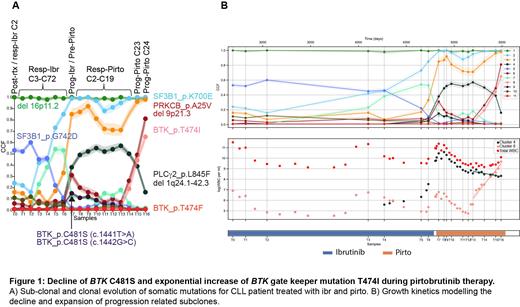Resistance mechanisms to covalent BTK inhibitors (cBTKi) are well studied, with mutations in BTK at the 481 target binding site most commonly identified, and, less commonly, activating mutations in PLCϒ 2. Second site non-481 BTK mutations have been identified among patients on non-covalent BTK inhibitors (ncBTKi). The present study was designed to further evaluate these resistance mechanisms using dense serial sampling during therapy with both classes of BTKi and using mathematical modeling to analyze the rates of growth and decline of specific mutated clones.
We performed whole exome sequencing on matched tumor and normal samples from 19 CLL patients treated with BTK inhibitors (Ibrutinib, Ibr, 42% (8/19); Acalabrutinib, Acala, 21% (4/19) and Pirtobrutinib, Pirto, 37% (7/19)). The median number of longitudinal samples per patient per cohort was 6 for ibr (N=51 total samples), 11 for acala (N=46) and 15 for pirto (N=105). The median number of prior therapies in both the ibr and acala cohorts was 2 and high-risk genomic features del(17p) and del (11q) were both at 50% in acala cohort and 50% and 38% in the ibr group respectively. The ibr cohort had no prior BTKi therapy whereas 1 patient in the acala cohort had received spebrutinib, another cBTKi. The average time to progression (TTP) in the ibr and acala groups was comparable at 44.1 and 44.4 months respectively. The pirto cohort was more heavily pretreated with a median of 3 prior therapies and del(17p) in 28.6% and del(11q) in 42.8%. All patients in this cohort had prior cBTKi (4 patients had 1 and 3 patients had ≥2 cBTKi) and average TTP was shorter at 15.1 months.
At progression (PD), mutations in BTK C481S were found in 5 /8 patients (55%) in the ibr cohort with cancer cell fraction (CCF) > 80% in 3 patients. Two of these patients also have mutations in PLCϒ 2 (CCF > 30%). One patient in the cohort has an acquired PLCϒ 2 mutation (D1140N) with CCF>70%, without BTK C481S. Investigation of this patient's resistant clone growth kinetics (using WBC counts) demonstrates that the PLCϒ2 clone which was not detected at baseline takes over the population at ibr progression. Two patients in this cohort did not have either BTK or PLCϒ 2 mutations; however, one patient had 2 expanding subclones with known driver mutations ( TP53, BIRC3, del 8p). All 4 patients in the acala cohort have resistant clones harboring BTK C481S (CCF 16-75%) mutations, with T474I mutations present in 2 patients (CCF 4% and 26%) at progression. Growth kinetics analysis of the C481S clones for 3 patients shows steady increase during acala therapy, suggesting CLL progression in these two patients is driven by the C481S mutations.
All but one patient in the pirto cohort had developed PD on cBTKi and 71% (5/7) had BTK C481S mutations prior to starting pirto (CCF 26 - 99%). In all 5 cases, the C481S clone declines on pirto and at PD is replaced by the BTK gatekeeper mutation T474I (CCF 76 - 99%) in 3 patients, the kinase-inactive mutation BTK L528W (CCF 30%) in 1 patient, and mutations in other driver genes ( XPO1, MED12) in 1 patient. Growth kinetics analysis for 1 patient shows exponential decay of the C481S clone under pirto treatment, followed by slow steady growth of the T474I clone, with a sharp increase right before PD. In another patient, exponential growth of the T474I clone occurs during pirto treatment while the C481S clone steadily declines. Interestingly this patient also had an existing PLCϒ 2 mutation (L845F, CCF 42%) at baseline, acquired during ibr treatment, which also steadily decreased on pirto. In another patient previously treated with ibr, with baseline BTK mutations in C481R (CCF 29%), C481S (CCF 18%), and L528W (CCF 2%), the L528W clone steadily increases, while both C481S and C481R clones decrease during PD. This patient exhibits extreme multiclonal diversity of BTK mutations, with 8 different BTK mutations at the DNA level at the C481 site present both at baseline and at PD, with 56% reduction in total wild type reads at PD. Of the remaining two patients without baseline C481S mutations, one patient acquired T474I (CCF 99%) and the other patient acquired 1q gain (MCL1) and t(8;14) at progression.
Growth kinetics of different BTKi can vary based on their specific mechanism of action. The approach of combining WES data with growth pattern modeling can help unravel the complexities of tumor evolution and drug resistance for the different classes of BTKi. Data on comparative clone growth rates will be presented at the meeting.
Disclosures
Utro:IBM: Current Employment. Rhrissorrakrai:IBM: Current Employment. Levovitz:IBM: Current Employment. Davids:Adaptive Biosciences: Consultancy; AbbVie: Consultancy, Research Funding; Ascentage Pharma: Consultancy, Research Funding; Secura Bio: Consultancy; Genentech: Consultancy, Research Funding; Janssen: Consultancy; Merck: Consultancy; Mingsight Pharmaceuticals: Consultancy; Research to Practice: Consultancy; Aptitude Health: Consultancy; BeiGene: Consultancy; Eli Lilly: Consultancy; Curio Science: Consultancy; BMS: Consultancy; Surface Oncology: Research Funding; Novartis: Research Funding; Takeda: Consultancy; TG Therapeutics: Consultancy, Research Funding; AstraZeneca: Consultancy, Research Funding; MEI Pharma: Research Funding; ONO Pharmaceuticals: Consultancy. Leshchiner:ennov1 LLC.: Consultancy, Current equity holder in private company, Current holder of stock options in a privately-held company, Membership on an entity's Board of Directors or advisory committees; Nord Bio, Inc.: Consultancy, Current equity holder in private company, Current holder of stock options in a privately-held company, Membership on an entity's Board of Directors or advisory committees; PACT Pharma Inc.: Consultancy. Parida:IBM: Current Employment. Getz:Pharmacyclics: Research Funding; Ultima Genomics: Research Funding; Scorpion Therapeutics: Consultancy, Current equity holder in private company; IBM: Research Funding. Brown:Abbvie, Acerta/Astra-Zeneca, Alloplex Biotherapeutics, BeiGene, Genentech/Roche, Grifols Worldwide Operations, iOnctura, Kite, Loxo/Lilly, Merck, Numab Therapeutics, Pfizer, Pharmacyclics: Consultancy; BeiGene, Gilead, iOnctura, Loxo/Lilly, MEI Pharma, SecuraBio, TG Therapeutics: Research Funding.


This feature is available to Subscribers Only
Sign In or Create an Account Close Modal